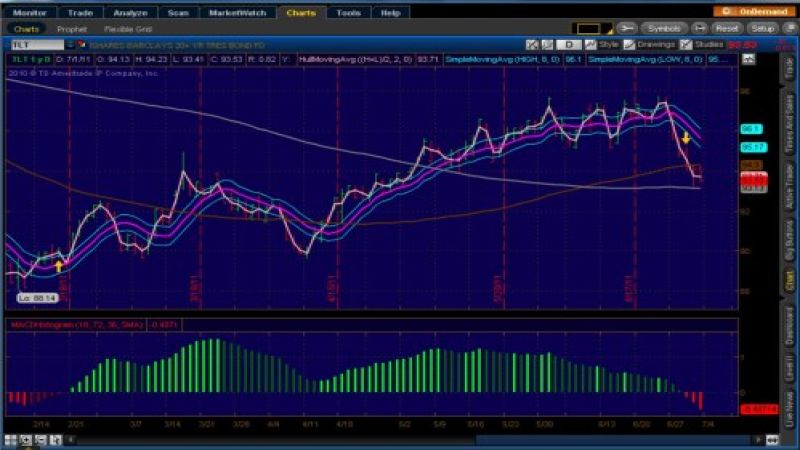With QE2 officially over, the ETF for the 20 year bond (TLT) is already showing signs of lower prices and higher interest rates. (Ref: Barclay's 20 Year Bond ETF (TLT). Daily chart by Frank Sherosky using thinkorswim platform)
Now think back to 2008 where we may be approaching another condition Yogi Berra often stated as, Deja Vu all over again. In other words, yes, we've been here before; it's just been a while.
Then think of the potential for sovereign defaults. Albeit a new occurrence for this generation, even that has happened before, just not with so many nations. That is why, in a detailed article by CNBC, the quote by Bruno Verstraete, CEO at Nautilus Invest used key words, like “zero exposure” as he justified his position to dumping stocks.
Fact is, even the Nautilus website states, “Take care of your wealth and your wealth will take care of you.” Not bad advice for anyone, whether you are in auto stocks or any other investments.
Truth is, all of us function as both investors and traders. The only difference is the timeframe. The name of the game, even according to legendary W.D. Gann, has always been speculation; and every speculative vehicle must be protected.
In my own book, “Awaken Your Speculator Mind,” I wrote that it is impossible to manage risk. I wrote that you can only manage yourself and your assets relative to all the risk that is about you. Point is, I still stand by that position.
As a speculator, it has also been my philosophy to move my money whenever necessary. Sometimes, I’m spot on; other times I vacillate between early and late. Hey, it’s a judgment call. One thing for certain, though, buy and hold without protection has proven to be a foolish strategy.
One hint I gleaned by researching the Nautilus website was this: Their client base and contacts give them the opportunity to invest in exclusive financial instruments that allow them to differentiate with better performing investments.
So, question is, are there better performing assets out there? And if you insist on holding your auto sector assets, are there ways to protect them? Answer to both is, yes. Think getting out; think reducing positions; or think protecting with options.
Obviously, getting out now takes you out of harms way while incurring a transaction fee from your broker. Frankly, the fee is often better than a loss, in my mind. However, once out, your money will have to sit somewhere else; and the choices are not high on the hit parade.
Another way is more measured, as in a reduction your positions, or partial sell off. In other words, take some off the table. If you have owned auto stocks for the past 12-18 months, you are likely in a profitable position. In the words of CNBC’s, Jim Cramer, host of Mad Money, “Bulls make money; bears make money; and pigs get slaughtered.” Actually that’s an old Wall Street cliché. Oink, oink!
The next measured way is to protect your positions with put options. You can retain the stocks. You can even offset the cost of the put options by selling higher-strike call options for income.
These are viable vehicles that act literally as insurance. Selling a call option on a stock you own produces income. Buying a put option at a lower strike gives you the right to sell a stock into the future at a specified strike price, provided the stock price at expiration is even to below the strike price of the option.
For example, with Toyota Motors (ADR: TM) trading today near $83.00, buying an OTM (out of the money) September or October $80 put (strike) would have zero intrinsic value until the stock broke below the strike. If the stock trades above the strike price at expiration, the put option represents time value only which would then be zero.
Selling a July or August 85 or 90 call, on the other hand, would give you immediate income to your account. Of course, you want the shortest time whenever you sell a call; and you want to sell the call when the stock is peaking. Good news is, you can do this month after month and garner income like a dividend, especially if the stock is bound by a price channel.
Realize the further out in time, though, the greater the cost of the options. Likewise, the higher the strike, or the more the option is in the money, the option would then have both time value and intrinsic value.
Out of the money put options are by far cheaper, but all are dependent on volatility, and often the weapon of choice for stock insurance. Still, some bears prefer stock replacement by buying puts deep in the money to take advantage of every down tick. It’s akin to going short without having the risk of having to make delivery.
Now lest you think this is a crazy alarmist article, CNBC noted Verstraete had said he believed market volatility would continue in the second half of the year and a number of factors would continue to weigh, particularly a slowdown in the Chinese economy and disagreement over raising the US debt ceiling.
Neither of those will bode well for auto stocks, unless you develop a trading mentality, where you buy the low of a channel and sell at the high of the trading range. Not everyone likes that style, though.
Bottom line: Just don't sit there like a deer looking into the headlights. QE2 is over and bonds are implying higher interest rates. Just be prepared is all I'm saying.
Full Disclosure: At time of publication, Sherosky, creator of the auto sector charts for TN, is neither long or short with the mentioned stocks for futures, though positions can change at any time. None of the information in this article constitutes a recommendation, but an assessment or opinion.
-------------------------------------------------------------------------------
About the Reporter: After 39 years in the auto industry as a design engineer, Frank Sherosky now trades stocks, futures and writes articles, books and ebooks like, "Perfecting Corporate Character," "Awaken Your Speculator Mind", and "Millennial World Order" via authorfrank.com. He may be contacted here by email: [email protected]
________________________________________________
Additional Reading:
State business ranking by CNBC reflects same criteria important to auto industry
Why Obama's proposed CAFE standards to 56.2 mpg IS feasible
Obama uses reserves to slash gas prices by $1.50 per fill-up
Is end of Fed QE2 also D-Day for auto sector stocks?
Detroit 2.011 Autobeat Insider Conference addresses auto industry's new best practices
Reaction to Fed end of QE2 by bond market will surely affect auto industry
Set as google preferred source










